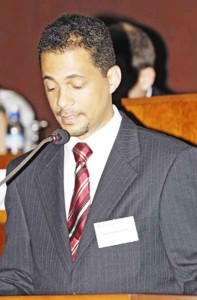– through EU-funded project
Guyana and the wider Caribbean are positioned to deepen relations with the French islands in the region following the launch of an ambitious European Union (EU) funded programme that proposes benefits in a reinforced interregional environment.

Interreg IV ‘Caribbean Space’ programme, which proposes stronger trans-border cooperation between the French Departments of the Americas (DFAs) and the greater Caribbean region over the next six years, was launched in Guadeloupe on Friday last amid calls for language barriers to be crossed, and for the goal of ‘one Caribbean space’ to be realized.
“We must as a region embrace our similarities and build on them but at the same time let us cross the hurdles that we face such as who among us speak French and who speak English and focus on working together and realizing the goals of Interreg IV,” Christian Baptiste of the Guadeloupe Regional Council stated.
Baptiste’s comment was echoed over the two-day period that Interreg IV was launched (September 25 and 26) as representatives from the DFAs — Guadeloupe, Martinique, and French Guiana — and representatives from the greater Caribbean gathered.
With the DFAs as the designated American Euro-regions that will benefit from special funding from Brussels to promote regional cooperation, Interreg IV, proposes that the DFAs merge in executing projects ranging from educational to agricultural with any of the countries in the greater Caribbean.
The EU has bumped up its funding from 24 million euros for the Interreg IIIB programme, which was initiated in 2006, to 63 million euros for Interreg IV including 75 per cent under the Regional European Development Fund (FEDER/ ERDF). The other 25 per cent is co-financed by the regional councils of Guadeloupe, French Guiana, Martinique, and the new implementing partners St Barthlemey, and Saint Martin.
Interreg IV has a project implementation from 2007-2013 and part of the proposal is for projects to be financed that will reinforce communication means, including transport and information technology, in the Caribbean. New projects in the field of sustainable tourism development and protection of land and maritime natural resources are poised to benefit from funding as the programme places a strong focus on supporting networks in research and innovation. It is compulsory for any implementing DFA to partner with a country outside the French Metropole in the Caribbean.
Claude Mainge, Director of Interreg IV told this newspaper that if any company in the greater Caribbean has an idea for a project and is seeking funding the stipulation is that it collaborates with a DFA, which are the implementing countries.
The Association of Caribbean States (ACS), the Organisation of Eastern Caribbean States (OECS) and Caricom are partners in the Interreg IV programme; and their roles were underscored as equally important in strengthening transnational cooperation through actions favourable to integrated territorial development in connection with the EU priorities.
Beverly Best, Head of Functional Cooperation and Programme Management Unit, OECS, pointed out during that launch that their presence in Guadeloupe was by no means accidental or incidental. She said it was strategic to the OECS’s overarching agenda of promoting enhanced joint cooperation and functional cooperation in a shared geographic space of the Eastern Caribbean that comprises French and English speaking populations.
She noted that under Interreg IV, the OECS will jointly pursue priority development projects that will unlock the potential niches and will foster sustainable development in the entire Eastern Caribbean region.
Best identified the main areas of interest to the region as being integrated tourism marketing and development (inclusive of tourism statistics and development of the health and wellness industry), health sector reform, technical and vocational education and training, small enterprise development, agricultural development and technology transfer among other areas.
According to her the intention is not to attempt to pursue all areas at the same time but, based on objective examination and discussion, to identify priorities that are both ambitious and realistic.
Assistant Secretary General of Cariforum, Willys Ramirez Diaz, who was in Guadeloupe for the launch of Interreg IV, told this newspaper that Guyana was unable to benefit from the previous programme due to financial constraints, in addition to another EU project that was being executed at the time.
But according to Ramirez the country stands to benefit if government and companies are following what Interreg is proposing. He said the door was open emphasizing that the focus of Interreg IV was on deepening relations with the greater Caribbean.
Ramirez noted that Cariforum will play a role in the implementation of any project that is being executed in the region under Interreg IV, adding that when he returns to Guyana the objective would be to contact the relevant agencies and individuals here to disseminate information on Interreg IV.
The region of Guadeloupe is responsible for the efficiency, regularity, management and implementation of the Interreg IV. Strategic decisions and selections of projects to be financed must be approved by the follow up and management committees composed of the implementing partners in the DFAs as well as representatives of the regional organizations such as the ACS, Caricom, Cariforum and the OECS.








